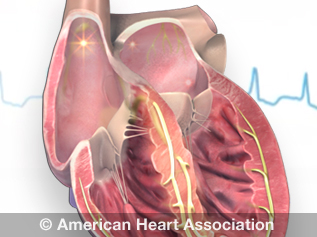Atrial Fibrillation in Children
Quick Facts
- Atrial fibrillation (AFib) is very rare in children.
- Your child’s pediatrician can order tests to help understand AFib symptoms.
- There are many treatments that can help children with AFib.

Does your child have atrial fibrillation? Here are some facts you should know.
Atrial fibrillation, also called AFib or AF, is very rare in children. The symptoms, diagnosis and treatments are similar as in adults.
A normal heart rate in children varies based on age. An infant’s heart rate might be higher than that of an older child.
Children with AFib have many electrical signals firing from a number of places in or around the heart. This causes the top part of the heart (atria) to fibrillate, or quiver. Then, the lower part of the heart (ventricles) contracts at an abnormal rate. This makes the heart work less effectively.
Your child may have a hard time explaining what they feel during an AFib event. Some might not notice any symptoms at all. See your pediatrician if your child has any of these or other new or concerning symptoms:
- Weakness or fatigue
- Tiring easily with exercise
- Pounding, pain or pressure in the chest
- Shortness of breath
- Fainting or feeling lightheaded
- Heart palpitations
- Heart fluttering or skipping a beat
The pediatrician may order one or more tests:
- Electrocardiogram (EKG) — Noninvasive test to view and record electrical patterns of the heart.
- Electrophysiology study — A small, thin catheter (or wire) is inserted through a vein into the heart. This allows doctors to find the sites causing abnormal heartbeats.
- Stress test — Shows how the heart works during exercise.
- Heart monitors — These are small monitors worn for one day up to one month. They can detect and record abnormal heart rhythms.
- Echocardiogram: An ultrasound looks at heart valves, chamber size and how well the heart pumps. The test can find areas of the heart muscle that aren’t pumping normally and can find blood clots.
- Blood tests: Check potassium and thyroid hormone levels to help find the cause of AFib. They can also help tell how well the kidneys and liver work.
- Cardiac MRI: May look at the structure of the left atrium and how well it works. Images can help find the cause of AFib and help health care professionals create a treatment plan.
Several treatments are available based on diagnostic testing.
AFib in children can usually be treated with medication. See your pediatrician if you suspect that your child has AFib. As with adults, the risk of stroke increases with AFib.
Some studies show that childhood AFib may be inherited. Others link it to heart problems present at birth (congenital heart defects) or problems after surgery.







